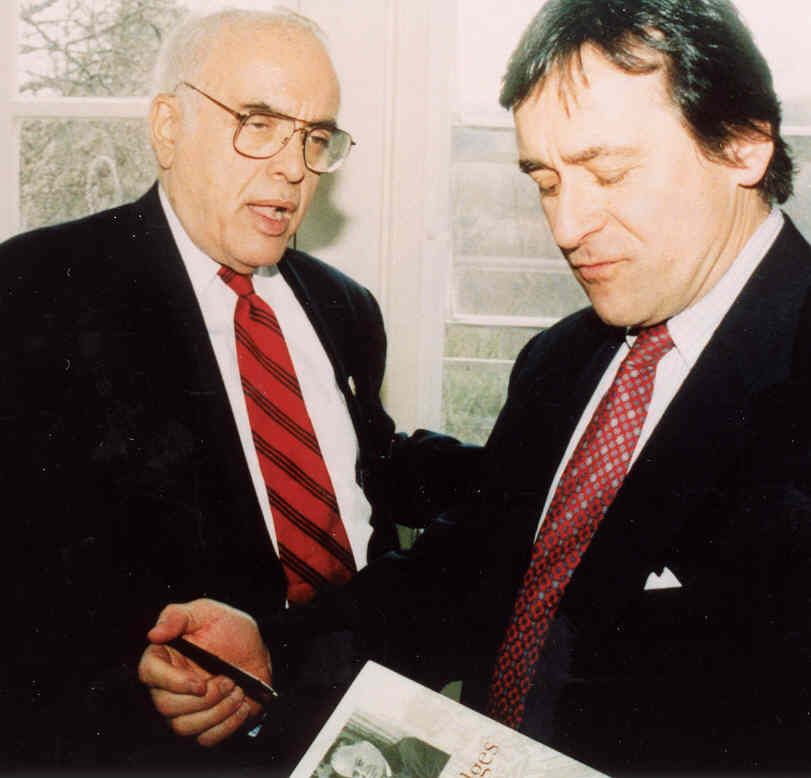

 By Dean Dexter
By Dean Dexter
________________
In the News
Kennedy: "What did Daniel Webster Do?"
Bob Novak RIP
Editorial Writer Plants Big Wet One of Jeanne Shaheen for Doing Her Job
Photo by Abigail Dexter
Columns
The Old Man is Gone, Get Over It!
One morning in May, 2003, the people of New Hampshire awoke to the news that an ancient natural rock formation high on a mountain in Franconia Notch, which when viewed at a certain angle bore a craggy, amazingly stark outline of a man’s profile, had slid off into oblivion sometime during the night after enduring centuries of fierce weather.
The news of the sudden disappearance of the Old Man of the Mountains, as this natural wonder had come to be known, shocked people. It had jutted out from a cliff some 1200 feet above the aptly named Profile Lake for who knows how long, maybe 10,000 years? Since the last Ice Age some geologists said.
There are very beautiful pictures nearly everywhere of the Old Man, for sale at gift shops or convenience stores around the state, or available on the internet. Yet none of these images do justice to what this configuration of rock appeared like in “person,” as it were. But everything is different in the mountains, anyway. Ask any skier, hiker or rock climber. The peaks, the sky, the air, the shadows against uncountable trees and boulders bring a hugeness of scale upon ones senses that invigorates, clears the head, sharpens the eye. So when you drove along amid all this, turned a corner in the road and looked up, suddenly you saw this giant brow and nose and chin emerge against the sky, and of course, no matter how many times you passed this way, you just had to pull over, stop the car, get out and stand there and take in That Face. That Great Stone Face as Hawthorne called it.
 July 19, 2002
July 19, 2002
After early 19th Century settlers happened upon him while mapping the wilderness, artists and poets were soon making the trek north on crude roads to paint and write about this visage. Before that, they say Indians venerated him. Certainly our forebears did. He was a sign that in New Hampshire “God makes men,” Daniel Webster supposedly wrote. In modern times the Old Man’s image was placed on the state’s license plates, highway signs, and official and unofficial government logos and stationary, to say nothing of hundreds of kinds of souvenirs and promotional material. Years after he disappeared into a thousand pieces at the foot of a cliff, his image remains everywhere. We just don’t have the heart to let him go.
 July 20, 2003
July 20, 2003
Now, near an existing museum honoring his memory, we hear of plans to create a Stonehenge-type “monument” to the Old Man of several acres, consisting of pathways and giant monoliths of granite to be situated near Cannon Mountain and Profile Lake. The idea is that as one observes these slabs from a platform, an image of a profile will appear as one’s eye scans across them, just so.
Of course this is all preposterous. Well intentioned but preposterous. Not only will this not do justice to what the Old Man was, but these odd, unsightly configurations will disrupt a beautiful natural area, and create something that will lose meaning as years pass. Future generations will be as stumped about these strange shapes as we are about those weird face statues on Easter Island. They’ll probably think aliens placed them there. What we really need to be working on is something new for our road signage and license plates.
The Old Man of the Mountains is gone. It’s time to get over it and move on.
This article first appeared as a "Capital Offenses"
Column in the May, 2007 edition of New Hampshire Magazine. Opposing View:
Joseph. W. McQuaid in the New Hampshire Union Leader, May 19, 2010.
![]() "Legislature Says No Thanks, Old Man."
"Legislature Says No Thanks, Old Man."
Photographs by Richard Sleeper, courtesy of Mr. Sleeper and Lisa Harmon

President Dwight D. Eisenhower visits New Hampshire's 'Old Man of the Mountains,' June 24, 1955. From left: First District N. H. Congressman Chester E. Merrow of Ossipee; Second District Congressman Perkins Bass of Peterborough; Governor Lane Dwinell of Lebanon.
________________________________
Once Upon a Time, Eleanor C. Parker Had to Defend the Teaching of To Kill A Mockingbird, by Harper Lee, If You Can Believe It...
It was 1964 and although but a few decades ago, it was another world.
That summer, after a long debate in Washington, not unlike that seen in today’s headlines, which included a 54-day filibuster in the U.S. Senate, a landmark Civil Rights Act became law, essentially ending legal racial discrimination in the United States.
It was also the year the United Methodist Church voted to open its doors to people of all races, actually to “anyone,” again after lengthy soul-searching and at times a not so pleasant “conversation” among the members of its national conference.
And that fall, in 1964, a veteran New Hampshire school teacher was asked to account for the teaching of the book To Kill a Mockingbird in her high school senior English class.
The Laconia, New Hampshire of 1964 was very much like it is today. That is, it was a smallish, but vibrant community where everyone essentially knew everyone else, at least somewhat, but because fewer left the city after coming of age, and with no outlying shopping malls to draw people away to shop and work, life in Laconia then was perhaps tighter and more personal.

Eleanor C. Parker, Laconia High School, circa 1965-1966, Dean Dexter photo
So there was high drama the night the extraordinary Eleanor C. Parker, alumnus of Mount Holyoke and Boston University, went before the Laconia School Board that October to defend herself after a parent had complained to authorities about the Pulitzer Prize winning book her class was studying, published four years earlier by the southern writer, Harper Lee, now considered a classic
Miss Parker was a gracious person and not about the idea of whining or scolding or lecturing city officials or the community at large, about the need for “tolerance” and “acceptance,” all of which she could have probably gotten away with due to her teaching skills and kindly ways. Nor did she drag along her lawyer.
After advising her class that “anyone had a right to express his opinion and was therefore free to object to the book,” or return it unread, she told the board, her students, who she described as “alert and intelligent 18 year-olds, said they liked the book.” Not one objected to it.
“What happens if we are told we cannot discuss the book?” students asked of her, the day she was told to suspend study of To Kill a Mockingbird, pending school board action.
“The question I had to answer and wish now to make clear what my answer is,” Miss Parker told the school board that night, before a room over-flowing with parents and students, “If my class and I (and thus of course ultimately other classes and other teachers) are not allowed to continue to discuss this book, I shall have to ask the Laconia School Board to accept my resignation.”
“When I teach this book, I look at my students and hope that they and I, myself, will learn to be like Atticus (Atticus Finch, the principle character), to meet ignorance, hatred, prejudice, not with more ignorance, hatred, prejudice, but with understanding, goodness, love. This is my purpose in teaching Harper Lee’s To Kill a Mockingbird,” Miss Parker said, in a quiet voice, without a hint of tremor.
According to newspaper reports, “applause was deafening at this point.” And of course, the board unanimously gave a vote of confidence to Miss Parker and the school English Department.
Years earlier, Miss Parker had written about her love of teaching: “One of the most exciting experiences of my life occurs each fall when I meet a group of young personalities, knowing that I have a chance to help them discover things about themselves, about people, and about living…Even on the rainy day when everybody hates everything, especially school, even then I would teach because I love to…Through me the great ideas of the past may be turned by the young minds of the present into the pattern of the future. Since I could not do this of myself, I have a guide. One whom men of all ages have called the Master Teacher.”
That December, Miss Parker was named New Hampshire Teacher of the Year (1965), and was later a top finalist for National Teacher of the Year honors, awarded by Look Magazine. For many years thereafter, Miss Parker would serve the people of the city, and their children, as a much beloved and respected teacher at Laconia High School.
To the people who were packed into a meeting room one fall night many years ago, when a lone, unmarried school teacher put a career of over 20 years on the line, that her students might “discover things about themselves, about people, and about living,” would be one of those singular moments in the life of a small community. One that maybe comes along once in a generation, if that, a real life drama which could itself be worthy of Hollywood, and of a best selling book.
Dean Dexter is a former newspaperman, who has served as chairman of the Belknap County commission, the Laconia School Board, and as a state representative from Ward 4. He resides in Meredith and Concord.
Posted -- March 31, 2010
Column Published, Laconia Daily Sun, Thursday, April 8, 2010.
![]() Peter Pickney: Miss Parker, My Quiet Mentor
Peter Pickney: Miss Parker, My Quiet Mentor
________________________________

Washington, DC Protest March, September 12, 2009 -- Abigail Dexter Photos
For story, click here.

________________
Pat Buchanan: Is America Coming Apart? Click here
________________

-- Posted September 12, 2009
_______________________
Kennedy: "What did Daniel Webster Do?"

In President Obama's eulogy to the late Senator Edward M. Kennedy, he recounted an incident when still a senator wherein Kennedy asked him for a vote on a measure scheduled for St. Patrick's Day. Senator Obama thought the bill had little chance of passage, but promised to vote for it. When the vote was over, the measure passed to Obama's surprise. "Luck of the Irish," Kennedy quipped to the junior senator from Illinois.
Said the President: "Of course, luck had little to do with Ted Kennedy's legislative success, and he knew that. A few years ago, his father-in-law told him that he and Daniel Webster just might be the two greatest senators of all time. Without missing a beat, Teddy replied, "What did Webster do?"
We know Kennedy was joking (a statue of Webster graces the grounds of both the state houses of Massachusetts and New Hampshire), but we cannot let this statement, brought to our attention by a friend, pass without comment. For instance, New Hampshire-born Daniel Webster wrote all his own speeches and managed his senatorial duties without an Ivy League educated staff to prop him up. In fact, senators in Webster's day had no staff support at all, even responding to constituents in their own hand at their small desks on the senate floor. No saint (who is?), Webster incredibly pleaded (and won) landmark cases before the U.S. Supreme Court throughout his adult life, even as a sitting senator, cases that set a young nation on a steady legal course.
Two things Daniel Webster (born of a poor farmer) and Ted Kennedy (born to privilege and wealth) had in common, they both represented the Bay State in the nation's upper house for many years, and they both liked the booze. Otherwise, Kennedy and Webster had nothing in common. For more on Webster, click here, here, and here. Oh, and P.S. Daniel Webster did not write that dictionary.
Photo: Library of Congress ca. 1845-1849, Matthew Brady
-- Posted August 31, 2009
_______________________
Bob Novak Remembered by Ex-Aide/Reporter
 Bernadette Malone
Bernadette Malone
Former New Hampshire Union Leader-Sunday News editorial page editor Bernadette Malone remembers her old boss, the "Prince of Darkness," himself. Click here, here and here.
 Bob Novak
Bob Novak
-- Posted August 23, 2009
_______________________
Bob Novak RIP

The late legendary syndicated columnist Bob Novak and Dean Dexter discuss the late New Hampshire governor and long-time U.S. Senator Styles Bridges, who Novak knew well. Novak was in New Hampshire attending a reception upon the publication of the Bridges biography by Dr. James J. Kiepper April 27, 2001. Novak, who wrote the foreword for the book, announced his retirement as a syndicated columnist on August 4, 2008 after being diagnosed with a brain tumor. He succumbed to the illness on August 18, 2009. Click here. Roland Young Photo.
-- Posted August 18, 2009
_______________________
Editorial Writer Plants a Big Wet One on Jeanne Shaheen for doing her job!
An editorial in the New Hampshire Union Leader today congratulated the state's junior senator for her hour long conference call from Washington with constituents the other night on Healthcare overhaul legislation. The event took place during a vote on the so called Cash for Clunkers bill, which is driving up the cost of used cars and tempting people into more personal debt.
Shaheen had to break away occasionally for floor votes, but would return to hear comments and field questions. Her staff says the senator received some 15,160 calls during the session. Click here.
According to the editorial writer: "The senator's staff didn't screen out hard questions, either. Several opponents of Democratic health care reform proposals got to put the senator on the spot."
Sweet.
Many Democrat legislators are opting for such telethons to avoid potentially loud and negative scenes at face-to-face town hall meetings in their districts. Shaheen, never one to stick her neck out, has been mailing canned, uninspired, "safe" Democrat talking points about the need to "reform the system" for months, in response to constituent concerns about "Obamacare."
So, although it was really big of her to take some phone calls from the people who pay her $174,000 per year salary, not including thousands more for travel, office space, and staff, we just cannot wait to see the senator field questions in person. Your time is our time, right senator?
The big question will be, how Senator Shaheen ends up voting on this farce. But we know how she'll vote. The same way she voted for the Clunker bill. For it, unless a lot of other Democrats give her cover by jumping ship.
We can only hope.
Anyway, the title of the piece is, "Shaheen on call: The senator will speak with you."
Mighty nice of you Ma'am. Mighty nice of you indeed...
-- Posted August 10, 2009
_______________________
Sununu Says Souter Was Not His First Pick; Speaking of the Little Man, Saw Him the Other Day at Shaw's, Souter That Is...
In that Concord Monitor interview last week (see above), former White House Chief of Staff, and N.H. Governor John Sununu reveals his first pick for the Supreme Court vacancy created with the resignation of William Brennan in 1990 was not fellow Granite Stater David Souter, at all, but a conservative female Texas judge, believing it would be a feather in Bush 41's cap to appoint the second woman justice to the high court (click here for story). Sununu, says he took it at face value that Souter was a conservative, since that's how Souter ruled while on the bench in New Hampshire, and what he presented himself to be in the White House vetting process. Of course, Souter turned out to vote with the Court's liberal wing the majority of the time, until his retirement this Spring (click here).
Speaking of Souter, we ran into him the other day at the Concord (N.H.) Shaw's supermarket. He was roaming the aisle by himself, wearing a starched blue Oxford shirt, sans tie, and casual green slacks, probably L.L. Bean. He had his little basket and looked very serious. We did not approach him, as we are not acquainted (although we met once years ago, when he was state attorney general). We were struck, however, by how short he was, and how much he bore a likeness to an older version of that fraudulent poser from Massachusetts, Clark Rockefeller (aka Christian Karl Gerhartsreiter), when the ex-justice put on his horned-rimmed glasses to inspect the canned peas.

Okay...you would've had to have been there...
-- Posted July 26, 2009
_______________________
Contact: dd@NH Commentary
_______________________
![]() Dirty (Political) Laundry
-- Dean Dexter in New Hampshire Magazine
Dirty (Political) Laundry
-- Dean Dexter in New Hampshire Magazine
The Old Man is Gone. Get Over It. -- Dean Dexter
Pumping up the GOP in the Granite State -- Dean Dexter in New Hampshire Magazine
Another Generation, Another War -- Dean Dexter
New Hampshire Political Dynasties -- Dean Dexter
It's Blue Skies for Democrats in New Hampshire -- Dean Dexter
A Proposal to Rename the Whittemore School at UNH is an Outrage

__________________________________________________________________
Return to NH Commentary Home Page
© 2009-2010 NHCommentary.Com
P.O. Box 706
Concord, NH 03302